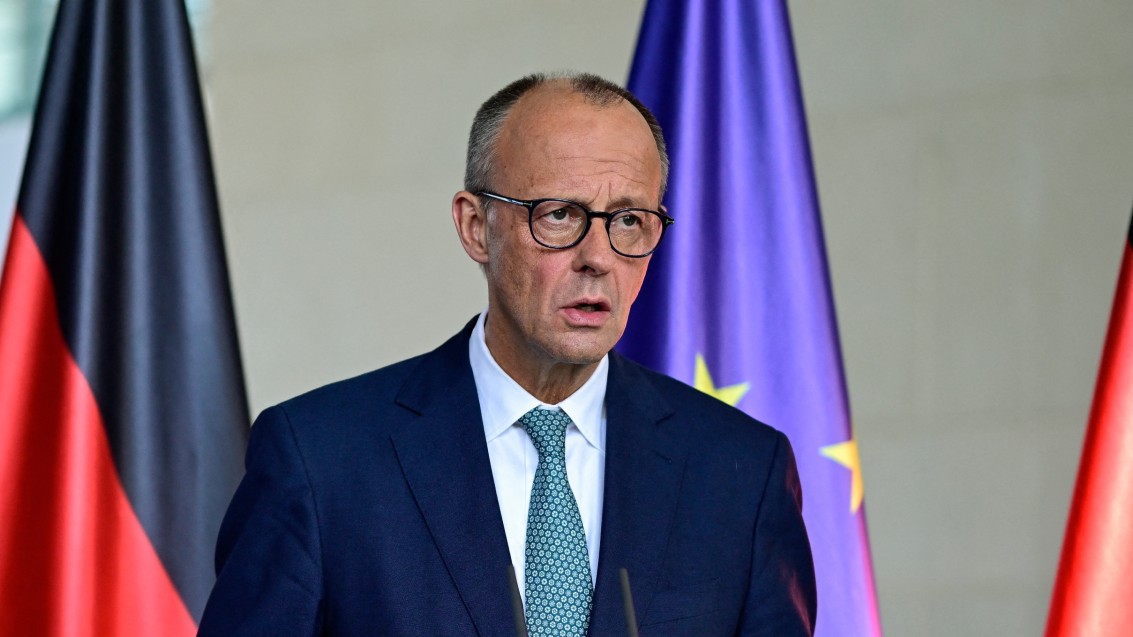Germany is halting further military exports to Israel that could be used in the Gaza Strip in response to Israel’s plan to fully occupy the Palestinian enclave.
Chancellor Friedrich Merz said on Friday that the exports were frozen “until further notice” and expressed concern for the plight of Gaza’s Palestinians, who are suffering under Israeli-imposed starvation.
Germany is Israel’s second largest supplier of arms, following the US.
Merz said it was Israel’s right to disarm Hamas and seek the release of its captives in Gaza, but that these goals have become harder to achieve due to Israel’s planned military action.
“The German government believes that the even tougher military action in the Gaza Strip decided upon by the Israeli cabinet last night makes it increasingly difficult to see how these goals can be achieved,” Merz said in a statement.
New MEE newsletter: Jerusalem Dispatch
Sign up to get the latest insights and analysis on
Israel-Palestine, alongside Turkey Unpacked and other MEE newsletters
“Under these circumstances, the German government will not approve any exports of military equipment that could be used in the Gaza Strip until further notice.”
The German reaction comes after Israeli media reports on Friday that Israel‘s security cabinet has approved a plan to fully occupy the Gaza Strip.
‘Germany must also use its special influence with Israel to compel an immediate ceasefire and withdrawal from Gaza’
– Ben Saul, UN expert
The operation is set to begin with the conquest of Gaza City, with the aim of clearing it of its approximately one million Palestinian residents.
While the official statement referred to the move as a “takeover”, Israeli news outlet Ynet reported that the term “occupy” was deliberately avoided to sidestep the legal obligations associated with formal occupation under international law.
A senior Israeli official told local media that the word choice was for official purposes only, confirming that the actual intention is to occupy the Gaza Strip.
The Israeli Prime Minister’s office said that the military will distribute “humanitarian assistance to the civilian population outside the combat zones”.
‘Long overdue’
United Nations expert Ben Saul welcomed Germany’s decision as “long overdue.”
“Germany has been exporting arms in violation of international law for almost two years,” Saul, who is the UN special rapporteur on human rights and counter-terrorism, told Middle East Eye.
“Germany must also use its special influence with Israel to compel an immediate ceasefire and withdrawal from Gaza,” he added, emphasising that Berlin should comply with the advisory opinion by the International Court of Justice in July 2024 on the illegality of the Israeli occupation and the obligations of third states to refrain from supporting the occupation.
The landmark advisory opinion confirmed that Israel’s occupation of Gaza and the West Bank, including East Jerusalem, was illegal, as well as the associated settlement regime in those areas, the annexation of land and the use of Palestinian natural resources.
“Germany should apply sanctions to Israeli political and military leaders, defence-related industries, and military cooperation,” Saul told MEE.
According to statistics by the Stockholm International Peace Research Institute (SIPRI), in 2023, Germany provided Israel with 47 percent of its total imports of conventional arms, with the US supplying 53 percent.
In 2023 alone, Germany approved €326.5m ($380.1m) worth of arms exports to Israel, according to SIPRI data analysed by Forensic Architecture.
Slovenia becomes first EU country to impose arms embargo on Israel
On 1 March 2024, Nicaragua brought a case against Germany at the International Court of Justice in The Hague, accusing it of complicity in genocide in Gaza due to its military, financial and political support to Israel after the devastating October 2023 military onslaught.
In June, the German Parliament said that between 7 October 2023 and 13 May 2025, Berlin granted export licences for military equipment to Israel worth €485m euros ($564m).
Last week, Slovenia became the first EU country to impose an arms embargo on Israel citing the European Union’s failure to take action to stop Israel’s assault on Gaza.
In their meeting in mid-July, the EU’s 27 foreign ministers failed to agree on the suspension of the controversial EU-Israel Association Agreement, which covers both trade and political relations. They also failed to agree on nine other possible measures against Israel put forward after it was found to have breached the human rights provisions of the trade agreement.
The measures that would have been agreed last month included full suspension of the agreement, suspension of its preferential trade provisions, an arms embargo, sanctions on Israeli ministers, or imposing a ban on trade with Israeli settlements in occupied Palestine.
Sweden and the Netherlands last week called on the EU to suspend the agreement with Israel over the continued Gaza siege and ban on the UN’s humanitarian aid operations.


